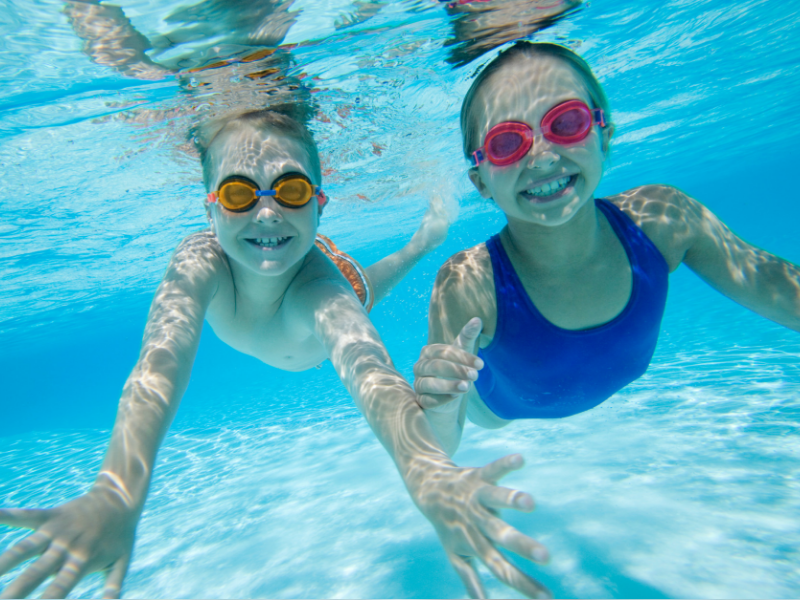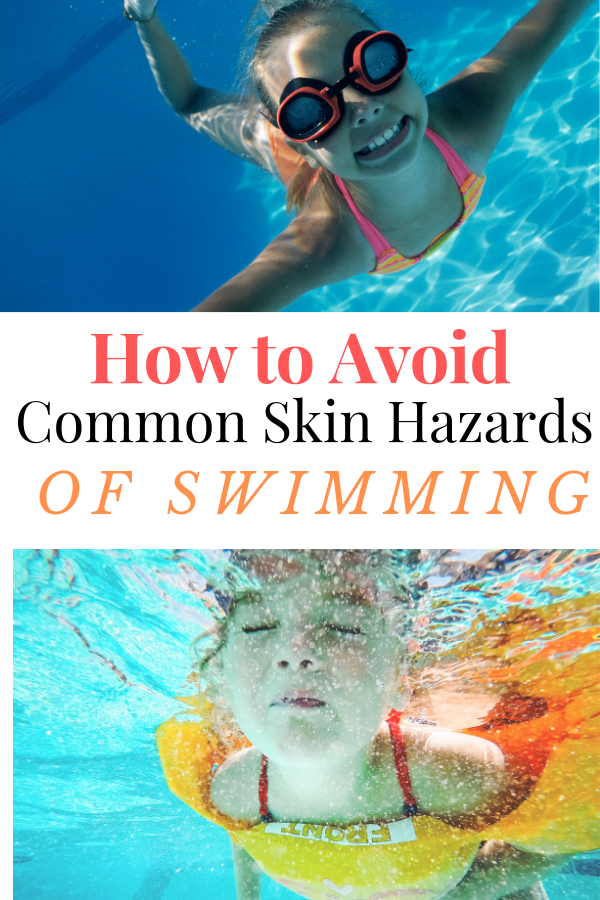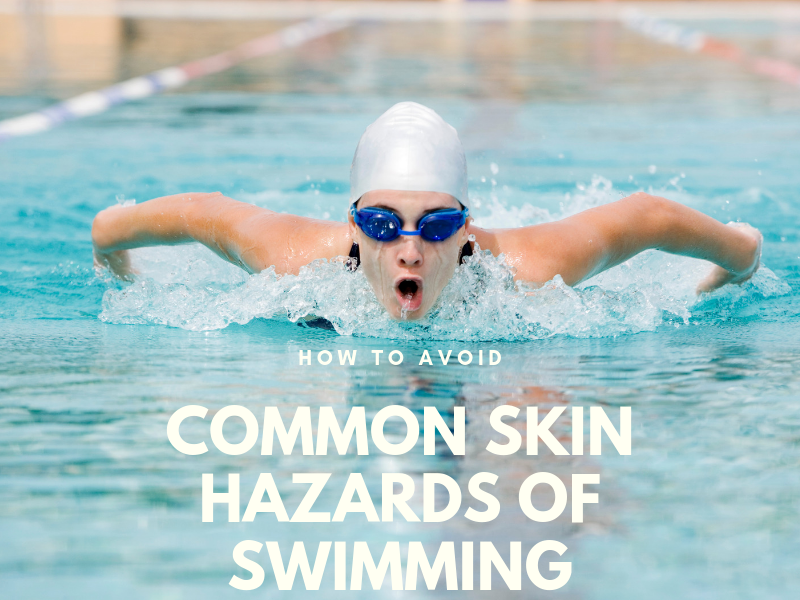How to Avoid Common Skin Hazards of Swimming
In the summer, we spend a lot of time at the pool. It’s our happy place and honestly also the focal point of my summer workout routine. Being able to jump in the pool after dinner, or on a scorching hot long weekend afternoon makes June, July and August worth looking forward to all year long.
But, that said, swimming and sunny days take a toll on your skin. We all know that firsthand. But what can you do about it?
Learning how to avoid common skin hazards of swimming can help swimmers manage water-related skin diseases and irritations while enjoying the pool again.

Table of Contents
Be a Bathing Beauty
Constant contact with water produces some common skin hazards in swimmers. Swimming pools, whirlpools, rivers, lakes and oceans all have their own health risks on the skin of swimmers. Here’s how to avoid and take care so you don’t have to skip swimming or sit life out on the deck this season.
Remember These Things to Steer Clear of Common Skin Hazards This Season
SPF – Sunscreen
First and foremost – use regular sun protection during swimming. A sun protection cream with an SPF of 30 or above should be applied to the exposed areas before venturing out in the sun or going anywhere near the water. Reapplication is necessary every 2-3 hours as water may wash off some of the cream. Toss the bottles when they have expired and keep plenty on hand all season long.
Don’t forget to check for things like whether the sunscreen is water resistant or waterproof. This is important for swimmers.
Moisturize
Apply moisturizers under your swimsuit. This will reduce chances of irritation and allergy from the material. Generally this is just a good rule of thumb for life. Moisturize always whether you swim or not.
Shower
I am guilty of not doing this often enough. I like the smell of a summer day and the swimming pool. But it is best for your skin if you shower immediately after swimming. Wipe skin with a towel and apply a moisturizer over the moist skin immediately afterwards. Applying moisturizer when the skin is still a bit damp will seal in moisture.
In the summer we live in our pool. One of us, or all of us, are always in doing laps or simply playing and diving. Summer is short, so we have to take advantage of swimming pool season. But the bromine and the time spent sunning and immersed definitely can take a toll on your skin. Take these precautions and remember after care and you will feel a lot better about getting back in next time.
And Don’t Forget These Common Sense Tips
Reapply sunscreen lotions as often and as needed.
Remain in the shade when not swimming and cover up.
HYDRATE!! Your skin needs water so drink up and your body will thank you.

Don’t Miss this – > Summer Bucket List Printable!
I know it’s tempting to consume fun summertime alcoholic drinks by the pool and nobody is saying not to do that. But also drink water and remind yourself of your limits. A couple of drinks no problem and also drink the water. My rule of thumb is a glass of water with or after any alcoholic beverage.
Tips on How to Manage Water-Related Skin Diseases
Sunburns: If you do get sunburns after swimming, immediately cover the area with either aloe vera or a moderately potent topical steroid ointment. Put on cotton clothing which will feel lighter on your inflamed skin and go sit indoors, preferably in air conditioning. You can alternate the steroid application with aloe vera containing moisturizing creams, once the acute burn starts subsiding.
Avoid going out in the sun or swimming during daytime for five to seven days. Take an antihistamine if you feel you need one. Drinking lots of water and fresh juices (except mango) will keep your skin hydrated and cool. Avoid alcohol and beer in excess, as these can have a drying effect on the skin. For severe sun burns you need to see a dermatologist.

Contact Dermatitis
Skin allergy caused by chemicals or aquatic life needs to be treated by a dermatologist or family doctor. If you get itching during or immediately after swimming (with or without rashes), take an antihistamine as above. Get out of the water and apply a moisturizing lotion to the area.
It is a good idea to carry an antihistamine and a moderately potent topical steroid in your first aid kit when you go swimming. You might ask for a prescription from your doctor or you could simply get one over the counter at the pharmacy. You should be aware of the side effects of topical steroids before using them.
Aquagenic Urticaria, Cold Urticaria or Aquagenic Pruritus
If you are suffering from any of these allergies to water or cold water, it is best to avoid swimming altogether. Swimming in the sea and swimming pools are definitely out of question if you have cold or aquagenic urticaria. If you get only mild itching, you may take a non sedating antihistamine at least half an hour before going in. Alert your companions and the life guard of your problem so they can keep an eye on you and always consult a doctor before and maybe even after swimming too.
Skin infections following swimming
Wash the body with fresh tap water immediately after bathing. Use an antibacterial soap. At the earliest sign of infection, an antibiotic cream like fucidin should be applied o the area. Most superficial infections will cease with this. If the infection is not showing signs of responding in a day, see your doctor.
Dryness
Applying a moisturizing cream or lotion immediately after swimming keeps the skin moist.
Swimmer’s Ear
You might consider putting a thick pad of cotton inside the ear before going to swim. Or you might wear ear plugs. Dry the ear canal with cotton buds immediately after swimming.
Eyes
My one girl gets super dry eyes after swimming. Sometimes that is better after a good rinse and other times she needs a Benadryl just to stop her eyes from irritating her. There are times you might want to flushing the eyes with saline eye drops a couple of times after swimming.
Goggles in the water make the most sense, but when dealing with tweens and teens sometimes they just don’t listen and opt not to use goggles so you may need the Benadryl afterwards if eyes are irritated.
Take Care and Use Moderation
In addition to the above, there are other common skin hazards that can occur. You want to enjoy your time swimming or outdoors in the nice weather, so remember that an ounce of prevention is worth a pound of cure. And more than anything sunscreen and shade, as well as water, are all your friends during the summer months!




